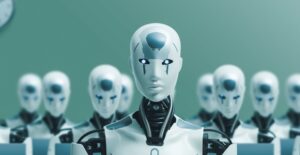Nobel committees have recognized the transformative power of artificial intelligence by honoring the developers of computational tools to study and design proteins with the chemistry prize, and pioneers of neural networks with the physics prize.
Demis Hassabis and John Jumper from Google's AI division DeepMind and David Baker from the University of Washington were awarded the 2024 Nobel Prize in Chemistry.
The pioneering work of these scientists has “cracked the code” of the building blocks of life: proteins, paving the way for advancements in drug development and enhancing our understanding of human biology.
Hassabis and Jumper were awarded for AlphaFold2, an AI system that accurately predicts the 3D structures of proteins from their amino acid sequences in minutes. Meanwhile, Baker won the Nobel Prize for his groundbreaking work in protein design. His research led to the development of entirely new proteins using amino acids, which had never before existed in nature.
 “One of the discoveries being recognized this year concerns the construction of spectacular proteins. The other is about fulfilling a 50-year-old dream: predicting protein structures from their amino acid sequences. Both of these discoveries open up vast possibilities,” says Heiner Linke, Chair of the Nobel Committee for Chemistry.
“One of the discoveries being recognized this year concerns the construction of spectacular proteins. The other is about fulfilling a 50-year-old dream: predicting protein structures from their amino acid sequences. Both of these discoveries open up vast possibilities,” says Heiner Linke, Chair of the Nobel Committee for Chemistry.
The first-ever Nobel Prize for AI technology was awarded in the field of physics. Geoffrey Hinton of Google DeepMind and Princeton professor John J. Hopfield received the honor for their groundbreaking work in artificial neural networks.
Hopfield developed an associative memory model capable of storing and reconstructing images and various data patterns. Meanwhile, Hinton pioneered a technique that enables the autonomous identification of properties within data, allowing for tasks such as detecting specific elements in images.
“The laureates’ work has already been of the greatest benefit. In physics we use artificial neural networks in a vast range of areas, such as developing new materials with specific properties,” says Ellen Moons, Chair of the Nobel Committee for Physics.
These breakthroughs underscore AI’s expanding role in scientific advancements across multiple fields. The Nobel Prizes have always celebrated human intelligence, and this year, for the first time, they have acknowledged the impact of AI in reshaping scientific research and discovery. However, some critics argue that recognizing AI in this way blurs the line between human ingenuity and machine-driven progress.
There are concerns about whether such recognition could overshadow other scientific disciplines and elevate AI above traditional research. Additionally, some experts fear that this recognition highlights how AI advancements could overshadow the value of human creativity and labor.
Another issue is that only a handful of corporations have the resources to build the most powerful AI systems. This concentration of power raises concerns about the possibility of monopolies within the AI sector, potentially resulting in significant disparities in both access to technology and opportunities for innovation.
“I’m speechless. I like machine learning and artificial neural networks as much as the next person, but it's hard to see that this is a physics discovery,” Jonathan Pritchard, an astrophysicist at Imperial College London, wrote on his social-media platform X. “Guess the Nobel got hit by AI hype.”
While there are concerns about the implications of awarding Nobel Prizes to AI research, many scientists welcomed the news, expressing optimism about AI's potential to enhance scientific discovery and drive advancements across various fields.
(Stokkete/Shutterstock)
Anil Ananthaswamy, the award-winning author of Why Machines Learn, points out that while the research awarded Nobel Prizes was powered by AI, it was fundamentally based on concepts and techniques from physics.
In a February interview with the New York Times’ Hard Fork podcast, Demis Hassabis discussed his perspective on the future role of artificial general intelligence (AGI) in society and the ongoing debate surrounding human versus artificial intelligence.
“We should be making tools to assist human experts and so on, whether they’re scientists or medics or whatever it is, to free them up to do the higher-level conceptual work,” said Hassabis. “(AI) systems can help you with data crunching or some sort of analysis of a medical image. But they’re not good enough yet to do the diagnosis themselves, in my opinion, or to trust them with that. There should be an expert human in the loop.”
“And I see that as the next phase, and for however many years or decades that will be. And then, maybe we’ll understand these systems better in the course of doing that, and we’ll be able to figure out what to build with them next to allow them to go to the next stage.”
As AI reshapes scientific research, the 2024 Nobel Prizes mark a significant acknowledgment of its influence. While these achievements are celebrated, the scientific community faces challenges in classifying and recognizing innovations that cross traditional boundaries. The debate surrounding these awards could define the future of scientific research, collaboration, and recognition in the era of AI.
